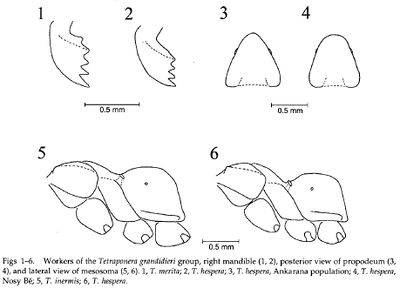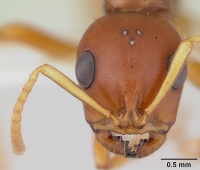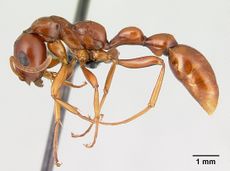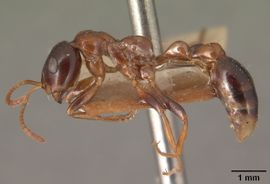Key to Tetraponera grandidieri species group
This worker key is based on: Ward, P.S. 2009. The ant genus Tetraponera in the Afrotropical region: the T. grandidieri group. Journal of Hymenoptera Research. 18:285-304.
Workers of closely related ant species can often be distinguished by differences in pilosity, sculpture and shape. Yet the species in the Tetraponera grandidieri group show quite limited divergence with respect to these kinds of characters. A brief examination of the male genitalia of four species (T. grandidieri, T. hespera, T. inermis and T. merita) failed to yield any obvious differences in the shapes of the aedeagus, paramere or subgenital plate (abdominal sternite 9), even though male genitalia often provide useful differences among closely related species in other groups of pseudomyrmecine ants (Ward 1999, 2001). Nevertheless the species recognized here occur sympatrically in various combinations and the slight differences between them are not blurred where they co-occur.
You may also be interested in
1
- Basal margin of mandible with a prominent tooth, in addition to four teeth on the masticatory margin (Fig. 1); anterior clypeal margin deflected ventrally; widespread in eastern and northern Madagascar . . . . . Tetraponera merita
- Basal margin of mandible lacking tooth, masticatory margin with four teeth (Fig. 2); anterior clypeal margin directed forward, not deflected ventrally . . . . . 2
2
return to couplet #1
- Petiole broad (PWI 0.61-0.65, DPW /HW 0.50-0.53), subtriangular in dorsal view, and with a relatively short, thick anterior peduncle; larger species, HW 1.48-1.58, LHT 1.64--1.76; known only from extreme southern Madagascar . . . . . Tetraponera manangotra
- Petiole more slender (PWI 0.40-0.53, DPW /HW 0.30-0.40), obovate, and with a thin, elongate anterior peduncle; smaller species, HW 0.95-1.44, LHT 1.05-1.59; widespread . . . . . 3
3
return to couplet #2
- Scape with conspicuous suberect and subdecumbent hairs; body tricolored: metasoma, appendages, and ventral margin of mesosoma orange, most of mesosoma reddish-brown, and head dark brownish black; endemic to Manongarivo Massif . . . . . Tetraponera hirsuta
- Most hairs on scape appressed or decumbent, and generally inconspicuous, except those at the apex; body color variable but usually without preceding tricolor pattern . . . . . 4
4
return to couplet #3
- Metanotal spiracle not protruding above the profile of the mesosoma, as seen in lateral view (Fig 5); head broad (CI 0.88-0.97); head and mesosoma reddish-brown, metasoma and appendages paler; widespread in eastern Madagascar . . . . . Tetraponera inermis
- Metanotal spiracle more or less protruding above the profile of the mesosoma, as seen in lateral view (Fig 6); head usually more elongate (CI 0.77-0.90); color variable . . . . . 5
5
return to couplet #4
- Dorsum of propodeum laterally compressed, the propodeum appearing subtriangular in posterior view (Fig 3); body concolorous orange-brown; northern Madagascar . . . . . Tetraponera hespera (in part - also #7) (Ankarana population)
- Dorsum of propodeum more broadly rounded, the propodeum appearing domeshaped in posterior view (Fig 4); color variable . . . . . 6
6
return to couplet #5
- Legs uniformly light orange-brown, femora lacking conspicuous black banding; body usually bicolored, such that dark head contrasts with lighter orange-brown mesosoma and metasoma, less commonly unicolorous orange; widespread and variable species . . . . . Tetraponera grandidieri
- Legs light orange-brown, with contrasting black bands on the distal portions of the mesofemur and metafemur; body concolorous or bicolored (in latter case both head and gaster are dark brownish-black) . . . . . 7
7
return to couplet #6
- Body concolorous yellow brown or orange brown; northwestern Madagascar . . . . . Tetraponera hespera (in part - also #5) (most populations)
- Body bicolored, head and gaster dark brown and contrasting with the lighter mesosoma; eastern Madagascar . . . . . Tetraponera variegata
















